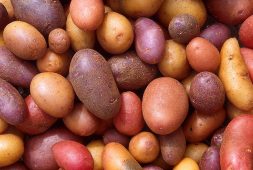
There are tons of misconceptions when it comes to carbohydrates, including how they could be detrimental to one’s health. Because of this, people have been obsessing with low-carb diets as a way to lose weight. But carbs shouldn’t have a bad rap, it’s just important to understand them. Here, we will take a look at what carbohydrates really are, as well as which are healthy options in comparison to unhealthy ones while discovering whether a diet that is rich in carbs is truly harmful or not.
To better understand what carbohydrates are, it’s important to know what they are first. According to the LiveScience website, ‘Carbohydrates are the sugars, starches and fibers found in fruits, grains, vegetables and milk products. Though often maligned in trendy diets, carbohydrates — one of the basic food groups — are important to a healthy diet.’
They are also one out of three macronutrients that happen naturally in plant foods such as nuts and seeds, peas and beans, fruits, vegetables, grains, and dairy and dairy products. Meanwhile, the other two macronutrients are proteins and dietary fats.
For a number of health organizations, including the World Health Organization (WHO), carbohydrates are explained as being essential nutrients for the body in order for it to function properly. Their main role is ‘to provide energy to all cells in the body.’ When there is a lack of carbohydrate intake, the body uses the alternative fuel source in the body called ketones.
In essence, “carbohydrate” is actually an umbrella term that encapsulates a large number of varying sugar-containing molecules that are present in foods.
Different Types of Carbohydrates
Essentially, there are three different types of carbohydrates: sugars, starches, and dietary fiber. Yet, classifying them as either simple or complex carbs is also acceptable, depending on the type and number of sugar molecules that each type contains, like in glucose.
Simple Carbohydrates
Other names for simple carbohydrates are “sugars, “simple sugars,” and “saccharides,” where the carb content is between one and 10 sugar molecules. Some examples of this are fruits, dairy products, and even in vegetables. As for the ones that only have one or two sugar molecules, they are referred to as monosaccharides and disaccharides, respectively. Meanwhile, those with up to 10 sugar molecules are called oligosaccharides.
As for lactose, which is the main sugar in milk produced by animals, it is ‘a disaccharide compromising the monosaccharides glucose and galactose.’
However, oligosaccharides are considered mid-length prebiotic carbohydrates that can be found in human milk and fiber-rich foods.
Complex Carbohydrates
As for complex carbohydrates, they are made up of polysaccharides which are described as ‘longer, intricate chains of sugar molecules,’ such as dietary fiber and starches.
Starches are considered the storage carbohydrates found in vegetables, beans, peas, and grains, which provide the body with energy.
As for Dietary fiber, also known as roughage, is the part of the plant that is considered indigestible like those in fruits, vegetables, whole grains, legumes such as peas and beans, and nuts and seeds, which is known to support good gut health.
‘Healthy’ vs ‘Unhealthy’ Carbs
Unfortunately for carbohydrates, they tend to get a bad rap because eating them in excess is often linked to weight gain, metabolic syndrome, obesity, and diabetes.
What’s referred to as “carbontoxicity,” this phenomenon supports the idea that an excessive consumption of carbohydrates of all kinds also promotes the development of chronic diseases.
Because of this, low carbohydrate diets have become more popular in individuals looking to lose weight or manage their blood sugar levels. In fact, even some older athletes practice this type of diet as well.
But, there are some studies that have shown how that it’s actually more important for people to understand that the quality of the carbohydrates is just as important as the quantity.
These findings imply that not all carbs are actually created equal, which means that some are better than others when it comes to overall health.
What Are ‘Unhealthy’ Carbs
For some, they consider unhealthy carbs as those that have less nutrition, such as:
- refined carbohydrates, such as polished rice and flour
- highly processed snacks, including cookies and pastries
- sugar-sweetened beverages, such as sodas and juices
Some current research shares that when someone has a diet that has a higher intake of these kinds of carbohydrates, and less of the other more nutritious ones, it can raise the markers of inflammation while promoting hormonal imbalanceswith women suffering from polycystic ovary syndrome.
In addition, the excessive consumption of simple added sugars is also associated with a higher risk of insulin resistance, heart disease, diabetes, stroke, non-alcohol-related fatty liver disease, and cancer.
But there are also studies that explain how added sugars and simple sugars that happen naturally in food might not have the same type of adverse effects.
In a 2018 study, it suggest that natural sources of sugar like honey could even help reduce blood sugar levels, while lessening the risk of getting type 2 diabetes.
Furthermore, fresh research has managed to further understand the negative health effects of these so-called unhealthy carbohydrate foods. Many experts suggest that individuals should eat a balanced diet mostly made of nutritious foods, while only eating this “unhealthy” carbs in moderation.
How About ‘Healthy’ Carbs?
When it comes to ‘healthy’ carbs, these are considered more nutrient-dense sources of carbs, such as:
- whole grains, such as whole grain flour, brown rice, and quinoa
- fruits, such as bananas, apples, and berries
- dairy and dairy products, such as low fat milk, and yogurt
- non-starchy vegetables, such as spinach, carrots, and tomatoes
- peas and beans, such as black beans, lentil peas, or garbanzo beans
There is also some research that links diets considered rich in complex carbohydrates, like the Mediterranean Diet. These provide anti-inflammatory benefits, reduced risk of chronic diseases, and lowered insulin resistance.
Many of these benefits are attributed to the dietary fiber content that’s found in complex carbohydrates. One example is the dietary fiber in whole fruits, which helps improve the long-term weight management and bolsters regular bowel movements, while promoting healthy aging.
Moreover, by further bolstering the quality of the diet by adding even more Dietary fiber and complex carbs, it can lead to some improvements in the usually adverse effects of PCOS, like elevated androgens and insulin resistance.
In a 2020 review, it was discovered that the dietary fiber found in whole grain foods provide many health benefits, such as lowering the risk of gut disorders, diabetes, heart disease, and cancer.
Figuring Out Which Carbs are the ‘Healthiest’
Experts tend to look at glycemic index (GI) and glycemic load (GL) to measure whether certain carbohydrates are considered “healthy” or “unhealthy.”
GI is described as ‘a measure of the blood sugar-raising potential of a single carbohydrate food compared with pure glucose.’
Primarily consisting of complex carbs, low GI foods tend to have low or minimal effects on a person’s blood sugar levels. These normally include non-starchy vegetables and whole grains. High GI foods, on the other hand, include potatoes and food that contains added sugars.
At the same time, people usually look at the GL to see how a meal manages to increase their blood sugar levels.
While people with diabetes have used both the GI and GL to guide their meal planning and manage their blood sugar levels, experts share that the science is still inconclusive.
Some studies share that having a higher intake of low GI foods means improved health. But other studies show that the differences between the daily glucose tolerance and individual responses are ‘responsible for blood sugar levels rather than the GI of the foods themselves.’ What this shows is that a food’s GI could not necessarily be a direct predictor of a person’s glycemic response.
Since there are big differences in the glycemic response from one person to another makes it harder to tell which carbs are really the healthiest, especially since some whole grains aren’t always consistent and need a more reliable measure of both the GI and GL.
So Are Diets Rich in Carbs Good For You or Not?
Even with the increasing popularity of low carb diets, it doesn’t mean that they are good or suitable for everyone. In fact, many people actually benefit from a carbohydrate-rich diet.
One example is the way athletes that require high endurance performance can actually become compromised due to following a low carbohydrate diet, which is why high carbohydrate diet is still the better choice for athletes, which is even backed by evidence.
As for others considered a part of the general population that have high carbohydrate intake, when there is a significant reduction in their blood sugar levels, it could possibly create a remission of prediabetes, which happens when they lessen their daily intake of carbohydrates.
So for those that eat 65-75% of their daily calories from carbohydrates, experts advocate lowering this amount to only 50-55% of carbs instead, and rather consume more protein.
While restricting one’s diet of carbohydrates to 45% or less of their daily calories, it can be more effective when it comes to short-term blood sugar control. However, it may be quite unsustainable while not necessarily promoting better long-term results than those with a daily calorie intake in the 50-55% range from carbohydrates.
Of course, before anyone makes any changes to their diet, they should always consult with their doctor, a registered dietitian, or a medical professional to figure out what amount of carbohydrates they need to better their health.
In Conclusion
The bottom line, carbohydrates are defined as a highly essential macronutrient that provides the body with energy, as well as dietary fiber to support better health.
Meanwhile, an excessive consumption of carbs is usually linked with weight gain and a higher risk of developing chronic disease like diabetes and heart disease.
Regardless of their negative reputation, carbohydrates actually provide loads of health benefits when someone frequently eats a variety of complex carbs and dietary fiber instead of sugary beverages and refined carbs.
It’s also important to note that one diet usually varies greatly from another, just like how athletes require carbohydrate-rich diets for better athletic performance. But as for non-athletic individuals that don’t take 65-75% of their daily calories from cabs, they tend to see a huge lowering of their blood sugar levels when they lessen their calorie intake from carbohydrates to 50-55% of their daily energy intake.
In conclusion, carbohydrates don’t have to be considered bad when people not only manage the amount of carbohydrates they ingest in their daily calorie intake, but when they figure out which ones are best for them and their particular needs.



